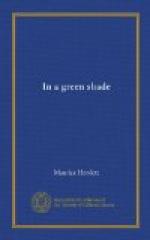To describe, however, the windings and circumfluences of rivers, the embraces of mountain and rain-cloud in language on the other side of amorousness may easily be inconvenient or ridiculous, and not impossibly both; but I shouldn’t at all mind upholding in public disputation, say, at the Poetry Bookshop, that there was no other way than Drayton’s of doing the thing at all. It was the mythopoetic way. For purposes of poetry, Britain is an unwieldy subject, and if you are to allow to a river no other characters than those of mud and ooze, swiftness or slowness, why, you will relate of it little but its rise, length and fall. Drayton’s weakness is that he can conceive of no other relation than a sex-relation, and in so describing the relations of every river in England, he very naturally becomes tedious. Satiety is the bane of the amorist, and of worse than he. Casanova had that in front of him when he set out to be immoral, on ne peut plus, in seven volumes octavo. There simply were not enough vices to go round. He ended, therefore, by being a dull as well as a dirty dog. “Take back your bonny Mrs. Behn,” said Walter Scott’s great-aunt to him after a short inspection, “and if you will take my advice, put her in the fire, for I found it impossible to get through the very first novel.” The nemesis of the pornographer: he can’t avoid boring you to tears.
THE WELTER
Soused still to the ears in the lees of war, I win a rueful reminder from a stray volume of Hours in a Library. Was the world regenerated between 1848 and 1855? Were English labourers all properly fed, housed and taught? Had the sanctity of domestic life acquired a new charm in the interval, and was the old quarrel between rich and poor definitely settled? Charles Kingsley (of whom the moralist was writing) seems really to have believed it, and attributed the exulting affirmative to—the Crimean War! The Crimean War, after our five years of colossal nightmare, looks to us like a bicker of gnats in a beam; yet perhaps any war will do for a text, since any war will produce some moral upheaval in the generations concerned. Let us suppose, then, that the British were seriously turned to domestic politics in 1855; let us admit that they are so turned to-day, and ask ourselves fairly whether we are now in a better way of reasonable living than history shows those poor devils to have been.




